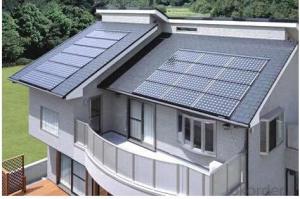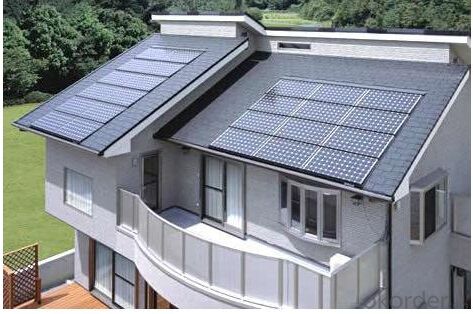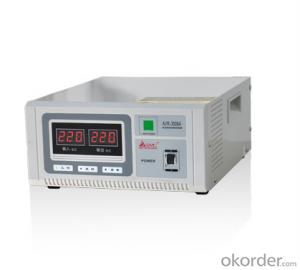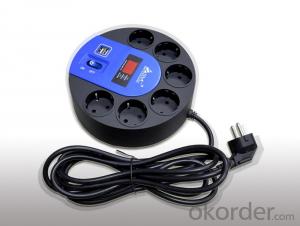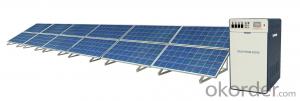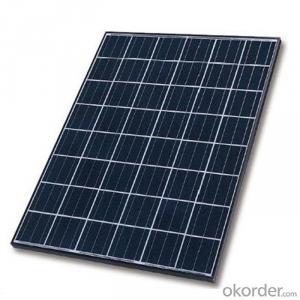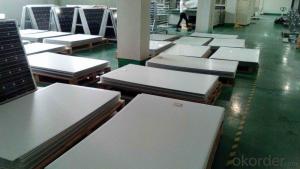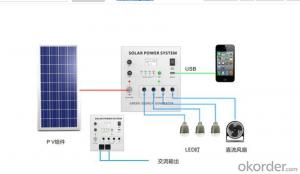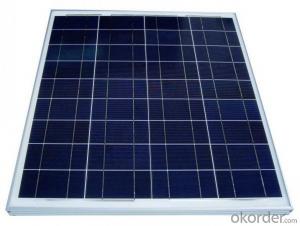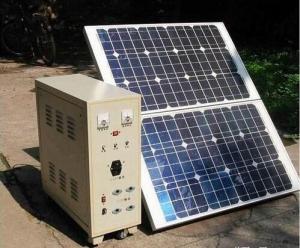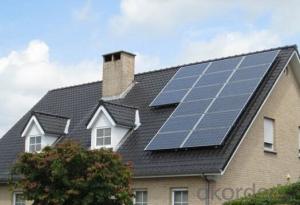Ses Solar Energy Systems 80w Solar System Made in China
- Loading Port:
- China Main Port
- Payment Terms:
- TT OR LC
- Min Order Qty:
- -
- Supply Capability:
- -
OKorder Service Pledge
Quality Product, Order Online Tracking, Timely Delivery
OKorder Financial Service
Credit Rating, Credit Services, Credit Purchasing
You Might Also Like
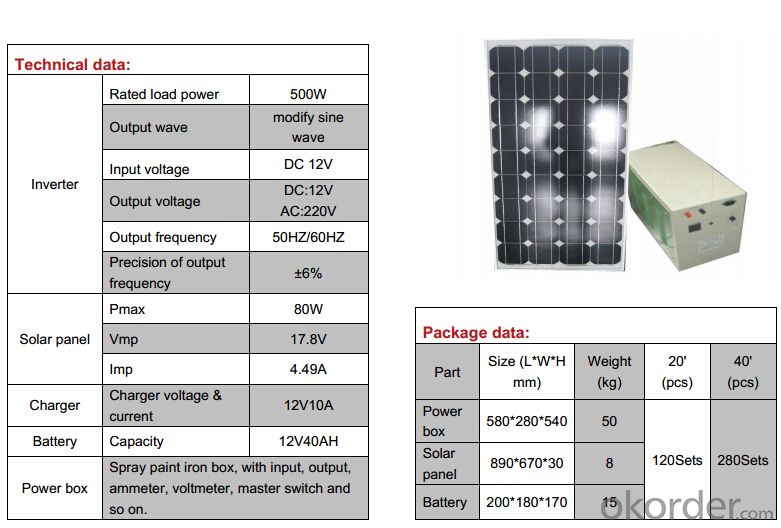
- Q: How do solar energy systems impact the reduction of energy transmission losses?
- Solar energy systems help reduce energy transmission losses by generating electricity directly at the point of consumption. This eliminates the need for long-distance transmission of electricity, which can result in significant losses due to resistance in power lines. By generating electricity on-site, solar energy systems minimize transmission distances, reducing energy losses and increasing overall efficiency.
- Q: Can a solar energy system be installed in areas prone to hailstorms?
- Yes, solar energy systems can be installed in areas prone to hailstorms. However, it is essential to consider certain factors to ensure their durability and resilience against hail damage. This includes using high-quality materials, such as tempered glass for solar panels, and proper installation techniques. Additionally, some solar panels are specifically designed to withstand hail and extreme weather conditions, providing further protection.
- Q: Are there any risks of electrical fires with solar energy systems?
- Yes, there are potential risks of electrical fires with solar energy systems. While solar panels themselves do not generate heat or pose a direct fire hazard, the electrical components and wiring involved in the system can be a source of concern. Poor installation, faulty wiring, or system malfunctions can lead to electrical fires. Therefore, it is important to ensure proper installation, regular maintenance, and adherence to safety guidelines to mitigate these risks.
- Q: What is the impact of hurricanes on solar panels?
- The impact of hurricanes on solar panels can be significant. Strong winds and flying debris during a hurricane can cause physical damage to the panels, leading to cracks, breakages, or even complete destruction. Additionally, heavy rain and flooding can damage the electrical components of the panels, reducing their efficiency or rendering them inoperable. Proper installation, maintenance, and storm preparation measures can help minimize the potential damage caused by hurricanes to solar panels.
- Q: What are the disadvantages of using solar energy?
- One disadvantage of using solar energy is its intermittent nature, as it is dependent on sunlight availability. Factors such as cloudy weather or nighttime can limit its energy generation. Additionally, solar panels and the necessary equipment can be expensive to install, which may deter some individuals or businesses from adopting solar energy.
- Q: How does the tilt angle of solar panels affect energy production?
- The tilt angle of solar panels significantly affects energy production. By adjusting the tilt angle, solar panels can optimize their exposure to sunlight and increase energy production. The ideal tilt angle differs based on the geographical location, time of year, and specific installation. Generally, tilting the panels towards the equator at an angle equal to the latitude helps maximize energy generation. However, a steeper tilt angle during winter months can enhance production by capturing more sunlight. Overall, adjusting the tilt angle is crucial for maximizing the efficiency and output of solar panels.
- Q: Can solar energy systems be used in powering banks or financial institutions?
- Yes, solar energy systems can certainly be used to power banks or financial institutions. Solar panels can be installed on the rooftops or premises of these establishments to generate electricity from sunlight. This renewable energy source can help reduce the reliance on traditional fossil fuel-based power, lower energy costs, and contribute to a greener and more sustainable operation for banks and financial institutions.
- Q: Can solar energy systems be used in military applications?
- Yes, solar energy systems can be used in military applications. Solar technology has proven to be highly adaptable and reliable, making it an attractive option for military operations. The military has recognized the benefits of solar energy systems in terms of reducing dependence on fossil fuels and improving energy security in remote or volatile regions. One of the key advantages of solar energy systems in military applications is their portability. Solar panels and related equipment can be easily transported and deployed in various locations, providing power for small-scale operations or even entire bases. This flexibility allows military units to operate in off-grid or austere environments where traditional energy sources may be scarce or unreliable. Solar energy systems can also enhance the sustainability and resilience of military operations. By generating renewable energy on-site, the military can reduce its carbon footprint and decrease reliance on vulnerable supply chains for fuel. Solar power can be integrated with energy storage solutions to ensure continuous power supply, even during grid outages or in combat situations. Furthermore, solar energy systems contribute to cost savings in the long run. While the initial investment may be higher compared to conventional energy sources, solar technology has become increasingly affordable. Over time, the operational and maintenance costs of solar systems are significantly lower than those of conventional energy sources. This can result in substantial savings for the military, allowing resources to be allocated to other critical areas. In addition to these benefits, solar energy systems also offer enhanced tactical advantages. Solar-powered equipment and devices can operate silently, reducing the risk of detection by enemy forces. Furthermore, solar energy systems can reduce the logistical burden of transporting and storing traditional energy sources, allowing military units to be more agile and efficient in their operations. Overall, solar energy systems offer numerous advantages for military applications. The technology's versatility, portability, sustainability, cost-effectiveness, and tactical benefits make it a valuable asset in enhancing military capabilities while reducing environmental impact and improving energy security.
- Q: Can a solar energy system be installed on a retail store or restaurant?
- Absolutely! It is entirely possible to install a solar energy system on a retail store or restaurant. As a matter of fact, numerous businesses within the retail and restaurant sector have already embraced solar power as a means to both decrease their energy expenses and contribute to a sustainable future. A store or restaurant can have solar panels installed on either its roof or parking lot, making the most of the abundant sunlight typically received in these locations. By harnessing the power of the sun, these establishments can generate clean and renewable energy to fulfill their electricity requirements. Moreover, the installation of a solar energy system can also yield various benefits, including tax incentives, lowered energy bills, and the establishment of a positive brand image that showcases the business's dedication to sustainability.
- Q: How efficient are solar energy systems?
- Solar energy systems are highly efficient as they convert sunlight directly into electricity or heat without any moving parts. With advancements in technology, solar panels have become more efficient, reaching conversion rates of up to 20-25%. However, overall efficiency can vary depending on factors such as location, weather conditions, and system design. Nonetheless, solar energy systems have proven to be a sustainable and reliable source of clean energy.
Send your message to us
Ses Solar Energy Systems 80w Solar System Made in China
- Loading Port:
- China Main Port
- Payment Terms:
- TT OR LC
- Min Order Qty:
- -
- Supply Capability:
- -
OKorder Service Pledge
Quality Product, Order Online Tracking, Timely Delivery
OKorder Financial Service
Credit Rating, Credit Services, Credit Purchasing
Similar products
Hot products
Hot Searches
Related keywords
